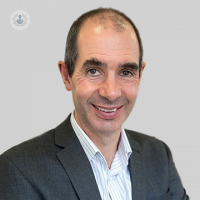Treatment for colorectal cancer and how to avoid it!
Written by:Colon cancer (also referred to as bowel cancer) is one of the more avoidable cancers. Some lifestyle changes may reduce the risk of developing the disease, but with screening, it can be prevented or detected at a curable stage. Dr John Martin, a leading gastroenterologist, discusses the treatment and prevention of colorectal cancer.

Early diagnosis can be life-saving
Survival is very much related to the stage of colorectal cancer upon diagnosis. So that it can be detected as early as possible, it is important to seek advice from your doctor if you have any of the following symptoms:
- a change in bowel habit - pooing more frequently, with looser poos
- blood in the poo
- abdominal pain or bloating that is always brought on by eating
- weight loss
Your doctor may then suggest investigation, normally with a colonoscopy, to exclude the presence of a cancer, or identify other causes of the symptoms. Colonoscopy also detects polyps (small benign growths) that have a possibility of turning into cancer and gastroenterologists can normally remove these at the initial colonoscopy, hence preventing the development of cancer. Click here to learn about colon polyps and the polypectomy procedure as explained by Dr Martin.
What happens if a diagnosis of colon cancer has been made?
If you are found to have colon cancer, your case will be discussed in a meeting attended by experts in the management of colorectal cancer including surgeons, radiologists, oncologists and gastroenterologists. Here, the most appropriate treatment plan will be decided after evaluating investigation results and overall health. After this meeting, this plan will be discussed with the patient to agree on the best way forward.
Colon cancer treatment
In some very early cases when the cancer is confined to a polyp, polypectomy will remove the cancer at the initial colonoscopy. However, subsequent surgery is often advised to remove adjacent lymph nodes that can sometimes contain cancerous cells.
The standard treatment of colon cancer is to surgically remove the cancerous tissue. This means removing the part of the colon containing the cancerous tissue along with some surrounding healthy tissue and the adjacent lymph nodes. If the cancer is more advanced when first detected, chemotherapy may be necessary after surgery. Very rarely is chemotherapy used before surgery for colon cancer.
Radiotherapy or chemoradiotherapy (a combination of chemo and radiotherapy) may be suggested prior to surgery for patients with rectal cancer.
In some cases, the cancer may have spread from the colon into other organs such as the liver or lungs by the time it is diagnosed. In these cases, additional surgery or other specialised treatments may be suggested in order to treat these areas and may still result in a cure. Unfortunately, for some patients with advanced disease, a cure is not possible and chemotherapy may be used to prolong life.
How to prevent developing colon cancer
There are certain lifestyle changes that are linked to reducing the chance of developing colon cancer. These include:
- replacing red and processed meat in your diet with fish, poultry, vegetables and fruits
- stopping smoking and alcohol consumption
- reducing obesity
- increasing physical activity and exercise
- maintaining regular and adequate amounts of sleep
Colon cancer screening significantly reduces colon cancer deaths by either removing non-cancerous colonic polyps before they transform into cancer, or by early detection of cancer so increasing the chance of survival. Learn more from Dr Martin about colon cancer screening here.
Screening is important no matter how good you feel
Some people may avoid screening for the following reasons:
- they believe they don’t need it because they feel healthy
- they don’t have a family history of colon cancer
- they might be embarrassed about having a colonoscopy
However, patients with colon cancer or polyps often don’t have symptoms and often occur in those with no family history. Patients are commonly surprised at how easy a colonoscopy procedure is.
The importance of surveillance after cancer
The recurrence of colon cancer at the site of removal is unlikely, although this can sometimes occur at the site where the bowel has been re-joined. Patients, however, may develop a second cancer at a different site in the colon or the original cancer may spread to another area of the body.
After entering remission and being cancer-free, patients are invited for future tests and colonoscopies to check for new polyps that could become cancerous in the future. The need for this will vary between patients, however, and your specialist will indicate what is necessary for your personal management. In addition to colonoscopy, you may be offered CT scans and blood tests to exclude the presence of tumour recurrence at other sites.
If you require a colorectal screening, don’t hesitate to book an appointment with one of the UK’s leading gastroenterologists, Dr John Martin, via his profile.


